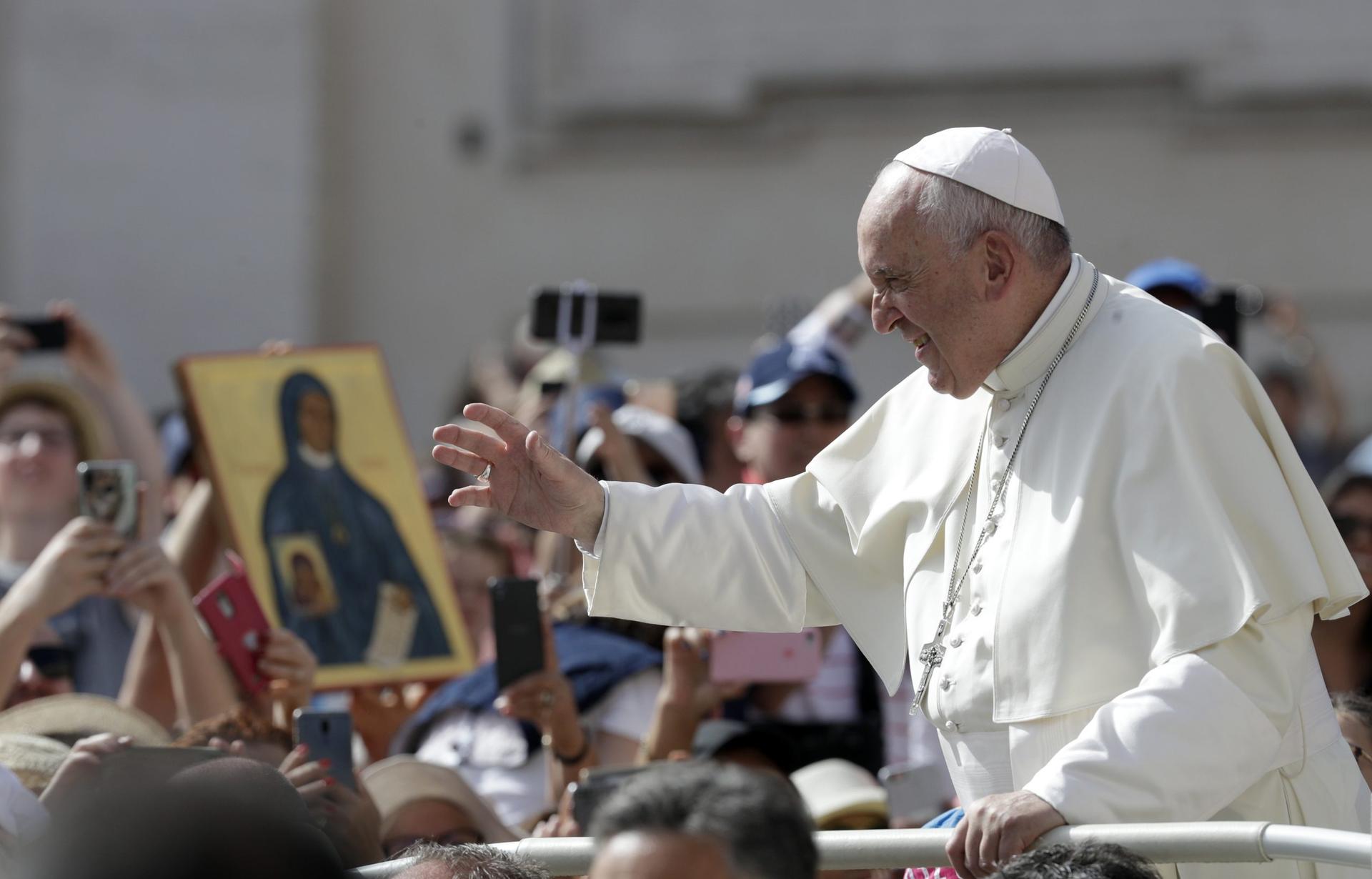ROME – Just days after the former papal representative to the United States renewed his criticism of the pope, Pope Francis told around 100 apostolic nuncios that it is “irreconcilable” to have the job and criticize the pope “behind his back.”
Though he didn’t give any names, Italian Archbishop Carlo Maria Viganò was most likely on the pope’s mind as he said this. The prelate made headlines last August, when he released an open letter calling on Francis to resign for allegedly disregarding restrictions placed on ex-cardinal and now ex-priest Theodore McCarrick.
Francis’s words came in the prepared remarks he handed to the nuncios gathered in Rome for what has become a once every three years meeting between the pope and the heads of the Vatican’s diplomatic missions around the world. However, he decided to let the prelates read the speech, and instead spoke to them off-the-cuff behind closed doors. The speech wasn’t broadcast, and the Vatican press office said it didn’t expect a transcript of the encounter to be released.
On Wednesday, Alessandro Gisotti, the Vatican spokesman, confirmed to Crux that Viganò is not attending the June 12-15 meeting, though retired nuncios were invited to participate on Friday.
On Tuesday, Viganò was at it again, with an interview in the The Washington Post. He answered 40 questions sent via email, and reiterated that his public accusations against the pope were made “out of love for the Church,” which he said, “is going through one of the most turbulent moments in her history.”
RELATED: As Vatican ambassadors meet in Rome, Viganò steals spotlight with interview
“Not only is Pope Francis doing close to nothing to punish those who have committed abuse, he is doing absolutely nothing to expose and bring to justice those who have, for decades, facilitated and covered up the abusers,” he wrote.
Francis also said that it is irreconcilable to “have blogs or even join groups hostile to him [the pope], the Curia and the Church of Rome.”
Viganò is not the only nuncio who fits this bill. Though he’s been quiet for some time now, Archbishop Thomas Gullickson, the papal ambassador to Switzerland and former representative to Ukraine, once used his blog to criticize the pontiff.
“As a Pontifical Representative, the Nuncio does not represent himself but the Successor of Peter and acts on his behalf,” Francis said, adding that this means a nuncio “concretizes, implements and symbolizes the presence of the pope among the faithful and the populations.”
RELATED: Gathering of papal ambassadors a sign of Vatican’s diplomatic touch
The pope acknowledged that every person can have “reservations, likes and dislikes,” but a good nuncio can’t be “hypocritical” because he serves as a bridge between the Vicar of Christ and the people whom he serves.
“Your mission, therefore, is very demanding because it requires availability and flexibility, humility, impeccable professionalism, communication and negotiation skills; requires frequent car journeys and long journeys, that is, living with a suitcase always ready (in our first meeting I told you: yours is a nomadic life),” he said.
Nuncios are called to be close to the faithful, the priests, the local bishops, other diplomats and rulers. Among many tasks, they play a key role in the appointment of bishops.
Being that he is a “representative,” the nuncio has to be up to date so that he can in fact follow the instructions of those he represents, and is also tasked with keeping the pope informed about the ecclesiastical and socio-political situations of the countries where he is stationed.
In his prepared remarks, Francis offered a list of ten “simple and elementary” precepts that define what is a nuncio, beginning with the fact that a papal representative is a “Man of God.”
“To be a man of God means to follow God in everything and for everything, to obey his commandments with joy; to live for the things of God and not for those of the world; to freely devote all his resources to Him by accepting with a generous spirit the sufferings that come as a result of the faith in him,” the pope said.
“The man of God knows how to walk humbly with his Lord, knowing that he must rely only on Him to be able to live fully and endure to the end, keeping the heart open to the disadvantaged and the rejected by society and listening to people’s problems without judging them,” Francis said. “The man of God is he who practices justice, love, clemency, piety and mercy.”
Also among the precepts were the fact that a nuncio is “a man of the Church,” “a man of apostolic zeal,” “a man of reconciliation,” “a man of initiative,” “a man of obedience,” “a man of prayer,” “a man of active charity,” and “a man of humility.”
Speaking about obedience, Francis said that the great commandment for this is that they are called to “obey God rather than men.” Yet obedience to God cannot occur separately from obedience to the Church and to superiors.
“St. Augustine attributes much importance to obedience, no less than that attributed to love, to humility, to wisdom, which are fundamental, to the point that there can be no true love, sincere humility, [or] authentic wisdom except in the ambit of obedience,” Francis said.
At the beginning of the meeting with the representatives, Francis remembered Archbishop Léon Kalenga Badikebele, apostolic nuncio to the pope’s Argentinian homeland, who died on Wednesday.
Follow Inés San Martín on Twitter: @inesanma
Crux is dedicated to smart, wired and independent reporting on the Vatican and worldwide Catholic Church. That kind of reporting doesn’t come cheap, and we need your support. You can help Crux by giving a small amount monthly, or with a onetime gift. Please remember, Crux is a for-profit organization, so contributions are not tax-deductible.













